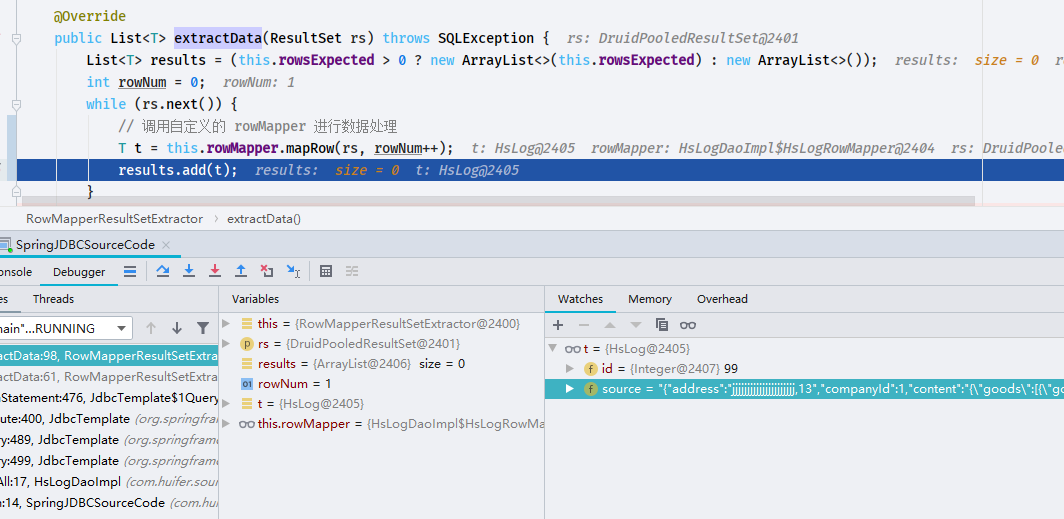Spring JDBC
- Author: HuiFer
- 源码阅读仓库: SourceHot-Spring
环境搭建
依赖
compile(project(":spring-jdbc"))compile group: 'com.alibaba', name: 'druid', version: '1.1.21'compile group: 'mysql', name: 'mysql-connector-java', version: '5.1.47'
db 配置
jdbc.url=jdbc.driverClass=jdbc.username=jdbc.password=
实体对象
public class HsLog {private Integer id;private String source;public Integer getId() {return id;}public void setId(Integer id) {this.id = id;}public String getSource() {return source;}public void setSource(String source) {this.source = source;}}
DAO
public interface HsLogDao {List<HsLog> findAll();void save(HsLog hsLog);}
实现类
```java public class HsLogDaoImpl extends JdbcDaoSupport implements HsLogDao {
@Overridepublic List<HsLog> findAll() {return this.getJdbcTemplate().query("select * from hs_log", new HsLogRowMapper());}@Overridepublic void save(HsLog hsLog) {this.getJdbcTemplate().update("insert into hs_log (SOURCE) values(?)", new Object[]{hsLog.getSource(),});}class HsLogRowMapper implements RowMapper<HsLog> {public HsLog mapRow(ResultSet rs, int rowNum) throws SQLException {HsLog log = new HsLog();log.setId(rs.getInt("id"));log.setSource(rs.getString("source"));return log;}}
}
- xml```xml<?xml version="1.0" encoding="UTF-8"?><beans xmlns:xsi="http://www.w3.org/2001/XMLSchema-instance"xmlns="http://www.springframework.org/schema/beans"xmlns:context="http://www.springframework.org/schema/context"xsi:schemaLocation="http://www.springframework.org/schema/beanshttp://www.springframework.org/schema/beans/spring-beans.xsdhttp://www.springframework.org/schema/context http://www.springframework.org/schema/context/spring-context-4.2.xsd"><context:property-placeholder location="classpath:db.properties"/><bean id="dataSource" class="com.alibaba.druid.pool.DruidDataSource" init-method="init" destroy-method="close"><property name="url"value="${jdbc.url}"/><property name="driverClassName" value="${jdbc.driverClass}"/><property name="username" value="${jdbc.username}"/><property name="password" value="${jdbc.password}"/><!-- 配置监控统计拦截的filters --><property name="filters" value="stat"/><!-- 配置初始化大小、最小、最大 --><property name="maxActive" value="20"/><property name="initialSize" value="1"/><property name="minIdle" value="1"/><!-- 配置获取连接等待超时的时间 --><property name="maxWait" value="60000"/><!-- 配置间隔多久才进行一次检测,检测需要关闭的空闲连接,单位是毫秒 --><property name="timeBetweenEvictionRunsMillis" value="60000"/><!-- 配置一个连接在池中最小生存的时间,单位是毫秒 --><property name="minEvictableIdleTimeMillis" value="300000"/><property name="testWhileIdle" value="true"/><property name="testOnBorrow" value="false"/><property name="testOnReturn" value="false"/><!-- 打开PSCache,并且指定每个连接上PSCache的大小 --><property name="poolPreparedStatements" value="true"/><property name="maxOpenPreparedStatements" value="20"/></bean><bean id="jdbcTemplate" class="org.springframework.jdbc.core.JdbcTemplate"><property name="dataSource" ref="dataSource"></property></bean><bean id="hsLogDao" class="com.huifer.source.spring.dao.impl.HsLogDaoImpl"><property name="jdbcTemplate" ref="jdbcTemplate"/></bean></beans>
运行方法
public class SpringJDBCSourceCode {public static void main(String[] args) {ApplicationContext applicationContext = new ClassPathXmlApplicationContext("JDBC-demo.xml");HsLogDaoImpl bean = applicationContext.getBean(HsLogDaoImpl.class);System.out.println(bean.findAll());HsLog hsLog = new HsLog();hsLog.setSource("jlkjll");bean.save(hsLog);}}
链接对象构造
Connection con = DataSourceUtils.getConnection(obtainDataSource());
public static Connection getConnection(DataSource dataSource) throws CannotGetJdbcConnectionException {try {return doGetConnection(dataSource);}catch (SQLException ex) {throw new CannotGetJdbcConnectionException("Failed to obtain JDBC Connection", ex);}catch (IllegalStateException ex) {throw new CannotGetJdbcConnectionException("Failed to obtain JDBC Connection: " + ex.getMessage());}}
org.springframework.jdbc.datasource.DataSourceUtils#doGetConnection
public static Connection doGetConnection(DataSource dataSource) throws SQLException {Assert.notNull(dataSource, "No DataSource specified");ConnectionHolder conHolder = (ConnectionHolder) TransactionSynchronizationManager.getResource(dataSource);if (conHolder != null && (conHolder.hasConnection() || conHolder.isSynchronizedWithTransaction())) {conHolder.requested();if (!conHolder.hasConnection()) {logger.debug("Fetching resumed JDBC Connection from DataSource");// 设置连接对象conHolder.setConnection(fetchConnection(dataSource));}return conHolder.getConnection();}// Else we either got no holder or an empty thread-bound holder here.logger.debug("Fetching JDBC Connection from DataSource");// 获取链接Connection con = fetchConnection(dataSource);// 当前线程支持同步if (TransactionSynchronizationManager.isSynchronizationActive()) {try {// Use same Connection for further JDBC actions within the transaction.// Thread-bound object will get removed by synchronization at transaction completion.// 在同一个事物中使用同一个链接对象ConnectionHolder holderToUse = conHolder;if (holderToUse == null) {holderToUse = new ConnectionHolder(con);}else {holderToUse.setConnection(con);}// 记录链接数量holderToUse.requested();TransactionSynchronizationManager.registerSynchronization(new ConnectionSynchronization(holderToUse, dataSource));holderToUse.setSynchronizedWithTransaction(true);if (holderToUse != conHolder) {TransactionSynchronizationManager.bindResource(dataSource, holderToUse);}}catch (RuntimeException ex) {// Unexpected exception from external delegation call -> close Connection and rethrow.releaseConnection(con, dataSource);throw ex;}}return con;}
释放资源
releaseConnection(con, dataSource);
org.springframework.jdbc.datasource.DataSourceUtils#releaseConnection
public static void releaseConnection(@Nullable Connection con, @Nullable DataSource dataSource) {try {doReleaseConnection(con, dataSource);}catch (SQLException ex) {logger.debug("Could not close JDBC Connection", ex);}catch (Throwable ex) {logger.debug("Unexpected exception on closing JDBC Connection", ex);}}
public static void doReleaseConnection(@Nullable Connection con, @Nullable DataSource dataSource) throws SQLException {if (con == null) {return;}if (dataSource != null) {ConnectionHolder conHolder = (ConnectionHolder) TransactionSynchronizationManager.getResource(dataSource);if (conHolder != null && connectionEquals(conHolder, con)) {// It's the transactional Connection: Don't close it.// 连接数-1conHolder.released();return;}}// 处理其他情况doCloseConnection(con, dataSource);}
org.springframework.transaction.support.ResourceHolderSupport
链接数
/*** Increase the reference count by one because the holder has been requested* (i.e. someone requested the resource held by it).*/public void requested() {this.referenceCount++;}/*** Decrease the reference count by one because the holder has been released* (i.e. someone released the resource held by it).*/public void released() {this.referenceCount--;}
查询解析
org.springframework.jdbc.core.JdbcTemplate
<bean id="jdbcTemplate" class="org.springframework.jdbc.core.JdbcTemplate"><property name="dataSource" ref="dataSource"></property></bean>
- 从配置中可以知道 JdbcTemplate 需要 dataSource 属性, 就从这里开始讲起
org.springframework.jdbc.support.JdbcAccessor.setDataSource, 这段代码就只做了赋值操作(依赖注入)
public void setDataSource(@Nullable DataSource dataSource) {this.dataSource = dataSource;}
- 下面
hsLogDao也是依赖注入本篇不做详细讲述。
org.springframework.jdbc.core.JdbcTemplate#query(java.lang.String, org.springframework.jdbc.core.RowMapper)
@Overridepublic List<HsLog> findAll() {return this.getJdbcTemplate().query("select * from hs_log", new HsLogRowMapper());}
@Override@Nullablepublic <T> T query(final String sql, final ResultSetExtractor<T> rse) throws DataAccessException {Assert.notNull(sql, "SQL must not be null");Assert.notNull(rse, "ResultSetExtractor must not be null");if (logger.isDebugEnabled()) {logger.debug("Executing SQL query [" + sql + "]");}/*** Callback to execute the query.*/class QueryStatementCallback implements StatementCallback<T>, SqlProvider {@Override@Nullablepublic T doInStatement(Statement stmt) throws SQLException {ResultSet rs = null;try {// 执行sqlrs = stmt.executeQuery(sql);// 1. org.springframework.jdbc.core.RowMapperResultSetExtractor.extractDatareturn rse.extractData(rs);}finally {JdbcUtils.closeResultSet(rs);}}@Overridepublic String getSql() {return sql;}}return execute(new QueryStatementCallback());}
@Override@Nullablepublic <T> T execute(StatementCallback<T> action) throws DataAccessException {Assert.notNull(action, "Callback object must not be null");Connection con = DataSourceUtils.getConnection(obtainDataSource());Statement stmt = null;try {stmt = con.createStatement();applyStatementSettings(stmt);// 执行T result = action.doInStatement(stmt);handleWarnings(stmt);return result;}catch (SQLException ex) {// Release Connection early, to avoid potential connection pool deadlock// in the case when the exception translator hasn't been initialized yet.String sql = getSql(action);JdbcUtils.closeStatement(stmt);stmt = null;DataSourceUtils.releaseConnection(con, getDataSource());con = null;throw translateException("StatementCallback", sql, ex);}finally {JdbcUtils.closeStatement(stmt);DataSourceUtils.releaseConnection(con, getDataSource());}}
@Overridepublic List<T> extractData(ResultSet rs) throws SQLException {List<T> results = (this.rowsExpected > 0 ? new ArrayList<>(this.rowsExpected) : new ArrayList<>());int rowNum = 0;while (rs.next()) {// 调用自定义的 rowMapper 进行数据处理T t = this.rowMapper.mapRow(rs, rowNum++);results.add(t);}return results;}

这样就可以获取到了
方法result没有什么操作直接返回即可
private static <T> T result(@Nullable T result) {Assert.state(result != null, "No result");return result;}
插入解析
@Overridepublic void save(HsLog hsLog) {this.getJdbcTemplate().update("insert into hs_log (SOURCE) values(?)", new Object[]{hsLog.getSource(),});}
org.springframework.jdbc.core.JdbcTemplate#update(org.springframework.jdbc.core.PreparedStatementCreator, org.springframework.jdbc.core.PreparedStatementSetter)
protected int update(final PreparedStatementCreator psc, @Nullable final PreparedStatementSetter pss)throws DataAccessException {logger.debug("Executing prepared SQL update");return updateCount(execute(psc, ps -> {try {if (pss != null) {// 设置请求参数pss.setValues(ps);}int rows = ps.executeUpdate();if (logger.isTraceEnabled()) {logger.trace("SQL update affected " + rows + " rows");}return rows;}finally {if (pss instanceof ParameterDisposer) {((ParameterDisposer) pss).cleanupParameters();}}}));}

